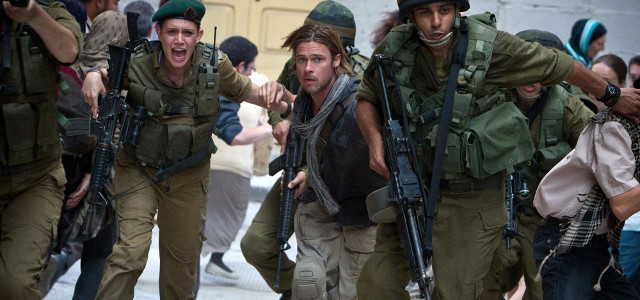
Between The Walking Dead and the 28 Days Later (now franchise) brand of undead storytelling it’s hard to believe that there’s still more room for more zombies. However, in my mind somehow I’m willing to entitle this a more globetrotting zombie tale, it’s like if James Bond (the new one) was tasked to save the world from zombies rather than asking Rick Grimes to figure out why he wanted to stay on the farm that long in Walking Dead.
With the world having gone all to shit, Gerry (Brad Pitt) is asked to return to his previous duties as an international investigator and figure out how this virus/disease/thing (because nobody knows what it is) started and possibly help figure out how to end it. With the help of a lot of military and a whole lot of luck along the way we follow Gerry across borders to solve this question.
It’s not coincidental that I quote two of the most popular, in recent memory, zombie properties to be released into the world in comparison to this film. Mainly because when I think of the parts of this movie that worked the best they evoke the best parts of those properties. In the first twenty minutes with Gerry traversing the streets of Philadelphia and then the stairwell in an apartment building in Newark trying to save his family, where he and his loved ones are in close proximity to the infected there are some high stakes set up very quickly and every moment that we see the zombies biting at the ankles of Gerry and his family we’re as frightened and heightened as Gerry is. Within those first twenty minutes we get not only these heightened sequences but there’s also some clear delineation showing us how society has quickly ended. When we see Gerry surrendering to a police officer after having killed a man, with just cause, and the police officer walks right by him for his own selfish reasons we know all structures of current society have ended and it’s time for a new slew of morals and ethics.
Maybe that’s why a lot of the international globe trotting didn’t do it for me. When it comes to this brand of storytelling I always find it a lot more interesting to delve into a writer’s mind of their own interpretation of how society changes upon the happening of this event. As opposed to watching James Bond run from town to town and zombie to zombie.

However, that’s not the movie that was on screen….
What strikes me taking in all this movie had to offer is I’m surprised how little this movie is about winning or fighting this supposed World War Z. It’s actually about Gerry’s search for a way to win the war. It’s ending becomes so oddly tame after the many close encounters that we’ve had following Gerry that we’re almost unsure as to whether the filmmakers are setting up a franchise, which would be surprising, or didn’t have anything else to do. The finale sequence ends up becoming less effective as you walk out of the theatre as you try to piece together all the bits of the puzzle that we got with Gerry and try to figure out how he happened to come up with the hypothesis that brought us to the climax.
There are many a film where critics — as do I — complain when the audience is able to figure it all out before the characters, but somehow I find this solution just as we go along nonsense. Or maybe the better expression is that it just feels like Gerry is making a few extra hop skips and jumps to find his conclusion and I as an audience member isn’t ready to make that many assumptions, but that’s just me nit picking.
The problem I really had with the film is that all the running around the world amounts to little effect. The film gives us moments with people like David Morse, as an Ex-CIA Agent, and Segen (Daniella Kertesz) which are not bad, but they barely touch on the character of Gerry himself. The film opens with these vague hints at Gerry’s old ‘dangerous’ life with conversations between him and his wife. With the collapse of the world he’s forced into returning to that life but this isn’t a Bryan Mills (from Taken) transformation and in the end feels uninteresting.